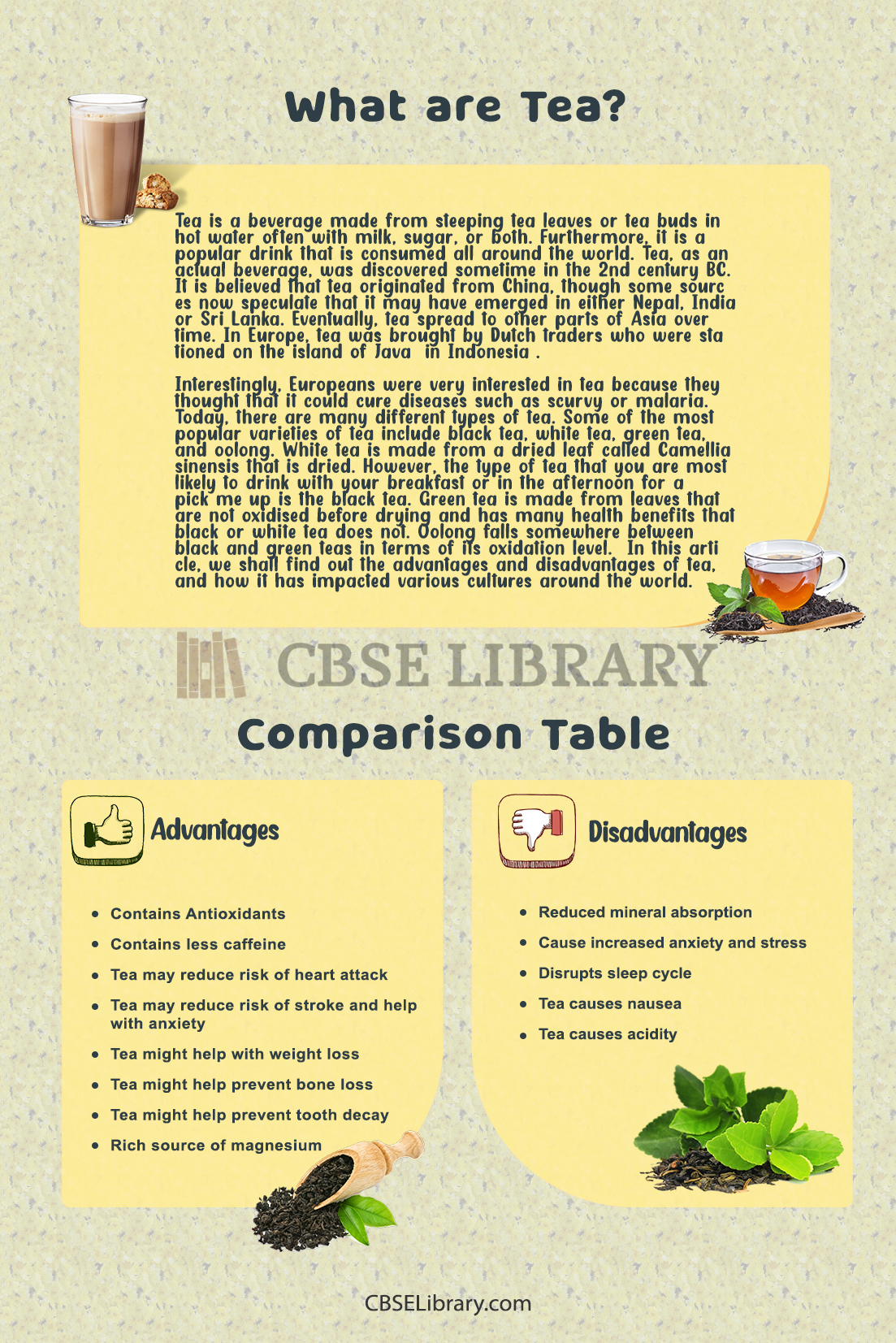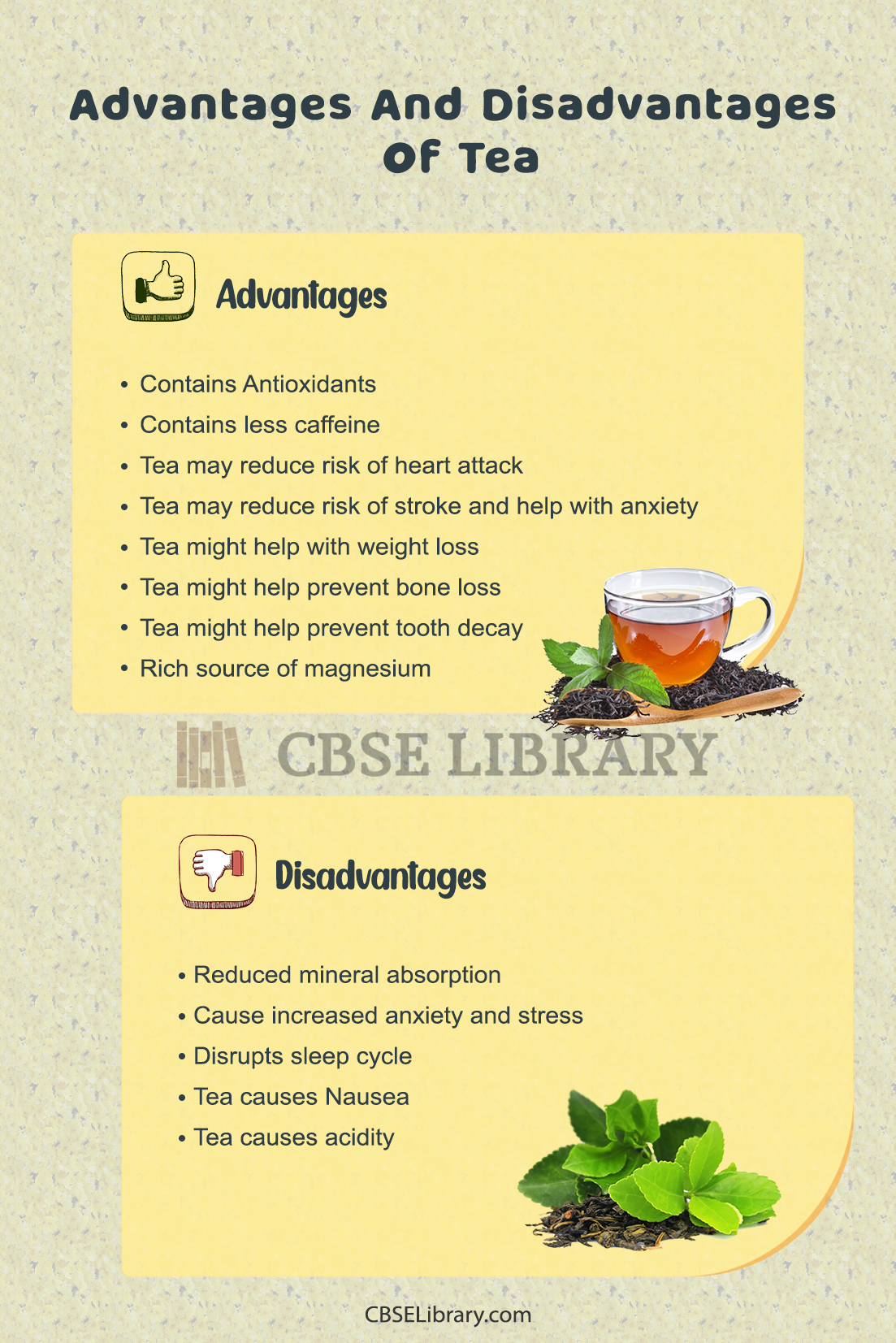Advantages And Disadvantages of Tea: Tea is a beverage made from steeping tea leaves or tea buds in hot water often with milk, sugar, or both. Furthermore, it is a popular drink that is consumed all around the world. Tea, as an actual beverage, was discovered sometime in the 2nd century BC. It is believed that tea originated from China, though some sources now speculate that it may have emerged in either Nepal, India or Sri Lanka. Eventually, tea spread to other parts of Asia over time. In Europe, tea was brought by Dutch traders who were stationed on the island of Java (in Indonesia).
Students can also find more Advantages and Disadvantages articles on events, persons, sports, technology, and many more.
Interestingly, Europeans were very interested in tea because they thought that it could cure diseases such as scurvy or malaria. Today, there are many different types of tea. Some of the most popular varieties of tea include black tea, white tea, green tea, and oolong. White tea is made from a dried leaf called Camellia sinensis that is dried. However, the type of tea that you are most likely to drink with your breakfast or in the afternoon for a pick-me-up is the black tea. Green tea is made from leaves that are not oxidised before drying and has many health benefits that black or white tea does not. Oolong falls somewhere between black and green teas in terms of its oxidation level. In this article, we shall find out the advantages and disadvantages of tea, and how it has impacted various cultures around the world.
- Advantages of Tea
- Disadvantages of Tea
- Comparison Table for Advantages and Disadvantages of Tea
- Conclusion on Tea – Advantages And Disadvantages
- FAQs on Advantages And Disadvantages of Tea
Advantages of Tea
Tea is the world’s most popular beverage, with over three billion cups consumed every day. It offers many benefits, including being a natural digestive aid and helping to lower blood pressure. Tea also has antioxidant properties that may help prevent cancer and other related illnesses. Other advantages of tea are as follows:
- Contains Antioxidants – Tea is an antioxidant powerhouse and has been proven to have a lot of health benefits. In fact, some studies have shown that drinking tea can reduce the risk of cardiovascular disease. When we drink tea, it releases antioxidants into the body to fight against free radicals. Free radicals are compounds that can damage cells and DNA to cause cancer. One study showed that drinking 3 cups of green tea per day reduces the risk of cancer by 12%.
- Contains less caffeine – Tea contains less caffeine than coffee, so it’s a better alternative for those who want to cut back on their caffeine intake. Additionally, one cup of tea will provide the same amount of antioxidants as two cups of coffee.
- Tea may reduce risk of heart attack – A study published in the British Medical Journal found that drinking three cups of tea a day can reduce the risk of heart attack by 14% over those who didn’t drink it. Tea has been shown to lower cholesterol, protect against heart disease, and maintain healthy skin. It’s also touted as a great beverage for weight loss.
- Tea may reduce risk of stroke and help with anxiety – Tea has been shown to reduce the risk of stroke. This is because it contains magnesium which is good for the blood vessels and the heart. Interestingly, tea may also relieve anxiety as it contains an amino acid called L-theanine. This chemical promotes feelings of relaxation without making people drowsy.
- Tea might help with weight loss – One of the reasons people drink tea is to lose weight. Moreover, tea can be a very good natural alternative for sugary drinks because it contains very little calories. The antioxidants found in tea are also linked to lower levels of belly fat, which can help with weight loss.
- Tea might help prevent bone loss – Tea has several properties that make it beneficial to health. For instance, it is known to strengthen bones – which is beneficial for postmenopausal women and adults who are at risk of osteoporosis.
- Tea might help prevent tooth decay – Tea can actually help prevent tooth decay. It contains fluoride which strengthens teeth and acts as a disinfectant. The tannins in tea also help chelate the bad chemicals out of the teeth. It is also believed that tea serves as a mild antibiotic which helps keep the mouth healthy by inhibiting growth of pathogens.
- Rich source of magnesium – One of the most important nutrients in tea is magnesium. Magnesium is an essential mineral that provides a wide range of health benefits, including boosting your immune system and helping to maintain a healthy heart. Tea also contains other important minerals like potassium and zinc which can help regulate blood sugar levels, lower bad cholesterol, and keep bones strong.
Disadvantages of Tea
As discussed, tea has a lot of advantages, but it is not without its downfall. Following are the disadvantages of tea:
- Reduced mineral absorption – Tea contains a lot of polyphenols. These polyphenols can inhibit iron absorption by binding to the iron in food, making it unavailable for the body to absorb. Studies have shown that tea drinkers had higher levels of serum ferritin, which indicates that they had an iron deficiency, despite adequate dietary intake of iron.
- Cause increased anxiety and stress – Many people drink tea as a way to reduce stress and anxiety. However, recent studies show that the caffeine in tea can actually cause increased anxiety and stress. This is because caffeine stimulates the central nervous system which causes a heightening of one’s alertness, appetite, and awareness. If it’s not consumed in moderation, it can lead to increased heart rate, muscle tremors, headaches and stomach irritation.
- Disrupts sleep cycle – Drinking tea, especially before bed disrupts the body’s natural sleep cycle. Caffeine is a stimulant, so drinking it too late in the day can cause insomnia. Even if you drink caffeine at other times of the day, drinking it late can keep you up at night.
- Tea causes Nausea – Tannins in tea can cause nausea and vomiting for some people, which is why many people drink milk with their tea. For those who are allergic to tannins, drinking milk doesn’t help.
- Tea causes acidity – Too much tea can cause acidity in the stomach, which is a condition where your stomach starts to build up too much acid. This will cause heartburn and can also negatively affect digestion. Other risks of drinking too much tea include esophageal reflux and kidney damage.

Comparison Table for Advantages and Disadvantages of Tea
Following are the advantages and disadvantages of Tea:
| Advantages | Disadvantages |
| Contains Antioxidants | Reduced mineral absorption |
| Contains less caffeine | Cause increased anxiety and stress |
| Tea may reduce risk of heart attack | Disrupts sleep cycle |
| Tea may reduce risk of stroke and help with anxiety | Tea causes nausea |
| Tea might help with weight loss | Tea causes acidity |
| Tea might help prevent bone loss | |
| Tea might help prevent tooth decay | |
| Rich source of magnesium |
Conclusion on Tea – Advantages And Disadvantages
Tea is a very popular drink around the world. People drink it to stay hydrated and enjoy its various flavours. It has been shown to have many benefits such as lowering the risk of heart disease, boosting brain activity, and protecting against some cancers. However, it can also lead to anxiety, high blood pressure and other unpleasant side effects if consumed in large quantities.

FAQs on Advantages And Disadvantages of Tea
Question 1.
What is Tea?
Answer:
Tea is made from the dried leaves and buds of the Camellia sinensis plant. It contains caffeine, which makes it a stimulant, but not as strong as caffeinated drinks such as coffee. Tea is drunk all over the world, with many varieties such as black, green, oolong, yellow, and white.
Question 2.
What are the advantages and disadvantages of Tea?
Answer:
There are many health benefits to drinking tea. Tea contains antioxidants, which help cleanse the body of toxins and give your immune system a boost. Tea also has a calming effect on the brain and helps reduce anxiety. One major disadvantage of tea is that it generally contains caffeine and this can lead to a dependency – or even an addiction.
Question 3.
Why is Tea important?
Answer:
Tea is an important part of many cultures. It has been around for centuries and is thought to have many health benefits, such as reducing cholesterol as well as controlling anxiety. Tea is also a huge part of Indian culture. One of the most popular styles of tea is Masala Chai. Masala Chai is prepared with a blend of herbs, spices, and milk.
